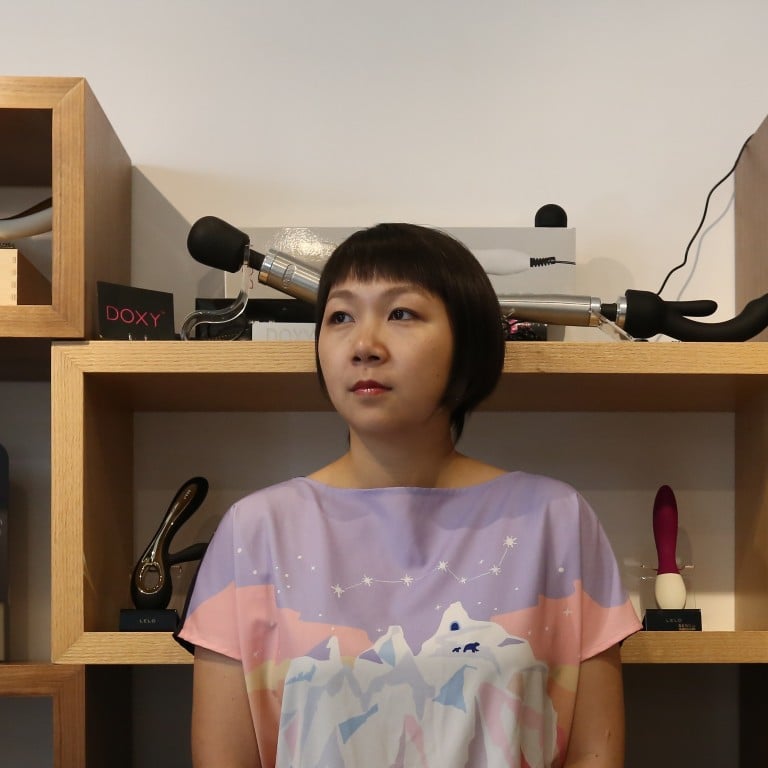
Hong Kong sex shops Sally’s Toy and Take Toy appealing to new customers in bid to destigmatise erotic aids and normalise sexual health discussion
- Fresh wave of erotica stores focusing on attracting wary shoppers, while distancing themselves from seedy image of sex industry
To erotic shop owner Vera Lui Wing-hang, receiving her first sex toy in her 20s from her boyfriend changed her attitude completely.
Lui, 32, who says her schooling lacked proper sex education, is surprised by how vibrators and other toys could serve as a tool to explore one’s own body, and as a facilitator to a relationship.
In 2010, driven by a desire to share what she had learned about sexuality, she decided to open a female-friendly sex toy shop that combines education with a private shopping experience.
“Ten years ago, most of the sex toy shops were decorated in a male-dominant way. Females might feel awkward and uncomfortable visiting them,” says Lui Wing-hang, who owns Sally’s Toy.
“Sex is still a stigma in most of the Asian regions, including Hong Kong.”
Sex shop owner using jiu-jitsu to tackle misconceptions
About 10 years later, Lui has expanded to four branches of the shop amid a booming market.
Esther Law, 24, a customer, says the modern sex toy shop looks stylish and luxurious, “unlike the disgusting traditional sex toy shops that put huge vibrators at the shop front”.
Being a regular visitor, she adds: “I also appreciated the way the staff here talk about sex, in a healthy and professional way.
“I used to be afraid of stepping in the shop, though I hoped to own a sex toy, because once a senior kept staring at my breasts like it is fine to scrutinise females that buy sex toys, which was an uncomfortable experience.”
There are at least 13 sex shops registered as licensed retailers around Causeway Bay and Central, according to an analysis by the Post, while there are at least eight in Tsim Sha Tsui.
There are also countless online sex product shops and vendors at Temple Street in Jordan.
Other studies suggested Hongkongers are increasingly unsatisfied with their bedroom experiences – only one in three were satisfied with their sex lives, according to a survey by Hong Kong Sex Education Association in 2017.
The online survey of 1,071 people has found only about 30 per cent of those polled were satisfied with their sex lives.
That compared poorly with Europe and the US, where it was roughly 50 per cent. Many cited pressure from work had affected the quality of their sex lives.
Sex and the City: Sex shop owner Jenny Wong
Professor Ng Man-lun, founder of the Hong Kong Sex Cultural Festival, has said many young people were not happy in bed because of study stress, and the city’s relatively conservative culture was also to blame.
In another sex toy shop Take Toy franchise, part-time staff member Justin Ho-ting Chu, who has just graduated from the University of Hong Kong, also aims to destigmatise and normalise sex toys through his daily interaction with customers.
Could sex tourism save Japan’s dying towns?
Based on the two-year experience of working in the shop, he observes that more manufacturers and retailers are rebranding their products towards sexual health and marital aid.
“Among most of the conservative jurisdictions in Asia, the Hong Kong legal system has a relatively loose definition of obscenity and indecency — at least compared with Korea and Singapore, ” Chu says.
“Destigmatising sexual products might be a commercial strategy to reach the wider market.”
Take Toys franchise owns nine branches across Wan Chai, Jordan and Sham Shui Po. It covers a wide range of products, including those aimed at the transgender market.
He is currently applying for a PhD on research topics related to the design and marketing of sex toys, and wants to be a sexual therapist.
“Labelling sex toy shopping as a stigma only remains for those who have not stepped in and seen for themselves,” Chu concludes.
